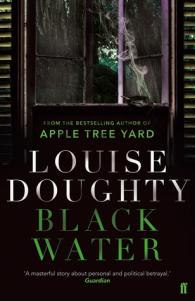
What’s it all about?:
John Harper lies awake at night in an isolated hut on an Indonesian island, listening to the rain on the roof and believing his life may be in danger. But he is less afraid of what is going to happen than of something he’s already done.
In a local town, he meets Rita, a woman with her own troubled history. They begin an affair – but can he allow himself to get involved when he knows this might put her at risk?
Moving between Europe during the cold war, California and the Civil Rights struggle, and Indonesia during the massacres of 1965 and the decades of military dictatorship that follow, Black Water is an epic novel that explores some of the darkest events of recent world history through the story of one troubled man.
Black Water confirms Louise Doughty’s position as one of our most important contemporary novelists. She writes with fierce intelligence and a fine-tuned sense of moral ambiguity that makes her fiction resonate in the reader’s mind long after the final page has been turned.
What did I think?:
Like many other people I’m sure Louise Doughty had me absolutely captivated with her last novel, Apple Tree Yard so when I saw Black Water, her latest story floating about on Twitter I knew I had to try and read it as soon as possible. A huge thank you to Sophie Portas and the lovely team at Faber & Faber publishers for sending me a copy in exchange for an honest review. I am going to be really honest and admit I was slightly disappointed with Black Water although it was still an enjoyable novel! Was I expecting another Apple Tree Yard? Perhaps I was and my expectations were stupidly high for her follow up. Black Water is quite a different beast of a story – quiet, relatively slow paced yet quite menacing and shocking in parts but I did appreciate how completely different it was in comparison to her last novel.
During the narrative, we become immersed in the present and past life of one man, known as John Harper but his birth name is actually Nicolaas, mixed race son of a Dutch woman and Indonesian man whom the Japanese cruelly decapitated when John/Nicolaas was quite young. John hasn’t had an easy life. There are many dark moments both in his childhood which we learn about in detail and when he becomes an adult and begins working for a shady agency operating in Indonesia in the 1960’s. When we first meet him in the late 90’s, he has returned to the island of Bali in some sort of disgrace and is determined that he is merely a sitting duck, waiting it out until his own people want to “get rid” of him because of his past misdemeanours. While he waits, he becomes involved with a woman called Rita who he unburdens some (yet not all) of his life story to and begins to feel some sort of happiness and hope again. We, the reader however know exactly what has happened to John in his life and the weight of what lies on his shoulders – who knows how it will all turn out?
So, when I started this book I did feel some trepidation. The narrative flits back between a number of time periods, the present time (1990’s), the time of John’s first tour in Indonesia (1960’s) and John’s early childhood (1940’s). We begin at the present time and I have to admit, I really wasn’t enjoying this portion of the story at all. At this time, I couldn’t sympathise with what John was going through and he came across as slightly unlikeable and not a character I felt I wanted to get to know. Then we go back in time and Louise Doughty, all is forgiven. The parts set in John’s past (when he was Nicolaas) were absolutely fantastic, thrilling and even heart-breaking at points. You really get a sense of why John is the way that he is although I could never quite understand or condone what he was doing in Indonesia or accept the horrific incident that he constantly berates himself for in the present time. Also, I wasn’t quite sure what to make of his relationship with Rita and to be perfectly honest, I’m not sure if their story was necessary for the novel? Compared to Apple Tree Yard, this is a slow burner of a novel but it is certainly worth it to get to the historical parts of the narrative which I thoroughly enjoyed. Finally, I know relatively little about the political situation in Indonesia in the 1960’s and it’s always fascinating to learn more about a period of history that you’ve previously been completely ignorant of.
Would I recommend it?:
Probably!
Star rating (out of 5):


